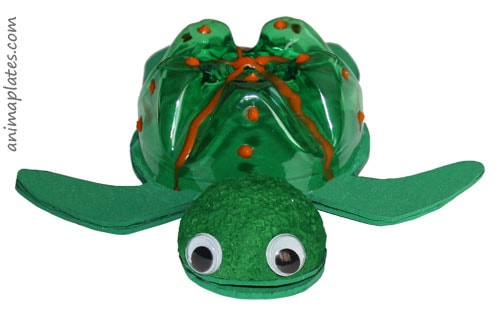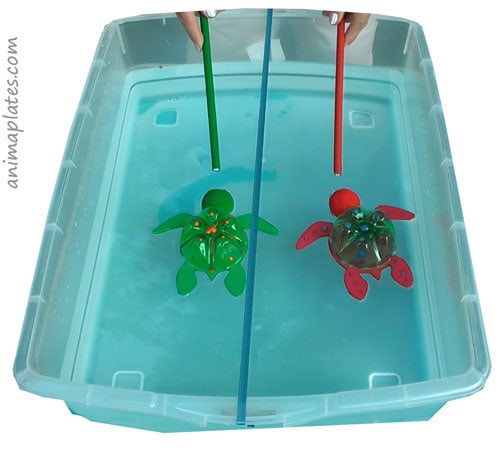What turtles can teach us
Turtles are reptiles that can be distinguished from other reptiles by the fact that they have a carapace. The carapace is made of bony plates that are welded to the skeleton. The carapace is a good protection against predators.
Some turtles live in fresh water (aquatic turtles), others live in the seas and the oceans (sea turtles) and there are also turtles that live on land (tortoises).
![By Strobilomyces (Own work) [CC BY-SA 3.0 or GFDL], via Wikimedia Commons](https://sp-ao.shortpixel.ai/client/to_auto,q_glossy,ret_img,w_512,h_341/http://animaplates.com/wp-content/uploads/2015/08/512px-Caretta_caretta_060417w2.jpg)
Art and Science
For this project, the body shape is based on the features of the legs of sea turtles.
By doing this 3-D visual art project, you can take the opportunity to teach some science topics about turtles. For some children, the ability to manipulate and create helps them to better retain the concepts. In this case, you can also talk about the different parts of the body of the turtle, where they live and the environment. Almost all sea turtles are classified as endangered. Climate change, habitat destruction and incidental capture in fishing nets are factors contributing to the decline in the marine turtle population.
As you can see, the materials used for this project are simple; you primarily need a foam sheet, a recycled plastic bottle, a Styrofoam ball and magnets.
Let the kids create their unique turtle. Some children will want to respect the original colours of some turtle species while others will want to create an imaginary species. The important thing is to give children the desire to create.

Magnetism
When children have finished creating their turtle, you can continue this activity with a new science lesson. Indeed, you can experiment with the properties of magnets and certain metallic objects. What do you think about creating a turtle race in a big water tank? When it’s hot, this activity can certainly be done outside! You will see that in a turtle race, turtles are not as slow as their reputation would suggest 😉

Reading
If you want to complete this activity by a reading activity, you could read a book about Franklin the turtle. Franklin is not a sea turtle or an aquatic turtle but rather a tortoise. Reading a book about Franklin will allow you to also talk about tortoises.
Paulette Bourgeois is the author of Franklin; she is from Winnipeg, Manitoba (Canada). She wrote a whole series of books. Benjamin’s stories enable children to identify with everyday situations such as fear of going to school or fear of storms, the arrival of a little brother or a little sister, Halloween or Christmas, etc.
The illustrations of Benjamin’s books are drawn by the illustrator Brenda Clark.
So this simple craft project opens the door to lots of possibilities!
Indeed, visual art often enables integration of different subjects; in this case, you can start with an art activity that allows you to teach natural science concepts about turtles. If you organize a turtle race, you can talk about magnetism. You can also integrate reading using the books by Paulette Bourgois.